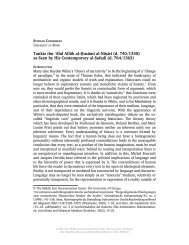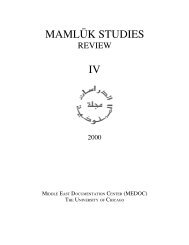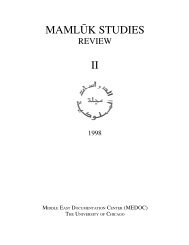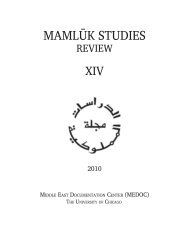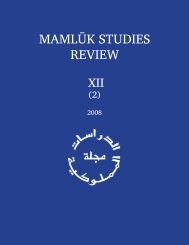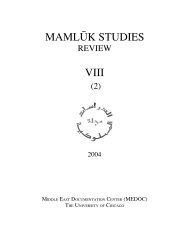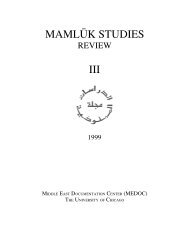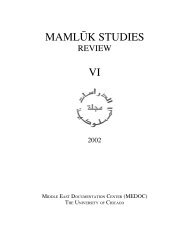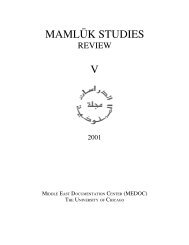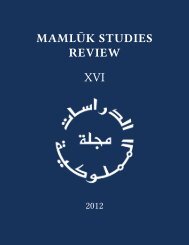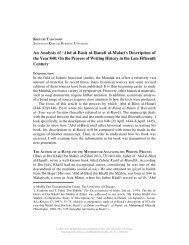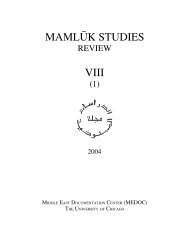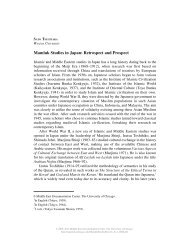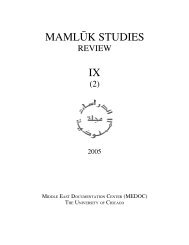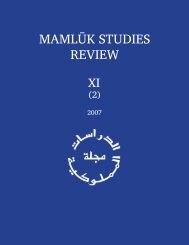Vol. VII, no. 1 (2003) - Mamluk Studies Review - University of Chicago
Vol. VII, no. 1 (2003) - Mamluk Studies Review - University of Chicago
Vol. VII, no. 1 (2003) - Mamluk Studies Review - University of Chicago
You also want an ePaper? Increase the reach of your titles
YUMPU automatically turns print PDFs into web optimized ePapers that Google loves.
ROBERT IRWIN<br />
LONDON, ENGLAND<br />
<strong>Mamluk</strong> Literature<br />
When the <strong>Mamluk</strong>s took power first in Egypt and then in Syria, there must have<br />
been many who viewed their ascendancy with dread. During the 650s/1250s the<br />
S˛a≠lih˝| Bahri mamluks had acquired a reputation as rapacious thugs. The <strong>Mamluk</strong><br />
Sultan Baybars (r. 658–76/1260–77), who was feared by his subjects rather than<br />
loved, had <strong>no</strong> literary culture and was, indeed, illiterate. Nevertheless, he did<br />
listen to readings <strong>of</strong> history. Specifically, he listened to the chronicle <strong>of</strong> his own<br />
exploits, the Rawd˝ al-Za≠hir f| S|rat al-Malik al-Z˛a≠hir, read to him by its author,<br />
the historian and senior chancery <strong>of</strong>ficial Muh˝y| al-D|n ibn ‘Abd al-Z˛a≠hir. The<br />
sultan al-Mans˝u≠r Qala≠wu≠n showed little or <strong>no</strong> interest in literature and his Arabic<br />
was <strong>no</strong>tably poor. However, as we shall see, even in that first generation <strong>of</strong> the<br />
<strong>Mamluk</strong> regime there were some amirs who took a serious interest in literature.<br />
More literate and literary mamluks emerged from the second and third generation<br />
<strong>of</strong> the military elite, for the <strong>Mamluk</strong> regime in Egypt and Syria relied on an<br />
unusually literate military elite. This was because the training <strong>of</strong> a young mamluk<br />
in the Cairo Citadel did <strong>no</strong>t just include exercises with sword, lance, and bow.<br />
Twice every week, Arab scholars from the city came in to instruct the young<br />
mamluks how to speak and read Arabic, as well as the tenets <strong>of</strong> Islam. There was<br />
a faq|h assigned to each barrack (t¸abaqah) whose job it was to teach the young<br />
mamluks the Quran, the Arabic script, and elements <strong>of</strong> the shari‘ah. 1 Evidence<br />
survives from the fifteenth and sixteenth centuries that the sultans' young mamluks<br />
in the Citadel were put to work copying manuscripts in the royal library. 2<br />
The Ayyubid library in the Citadel, the khiza≠nat al-kutub, had been destroyed<br />
by a fire in 1292, and it is <strong>no</strong>t clear what steps were taken to replace the lost<br />
volumes. Subsequently, the wealthy amir and friend <strong>of</strong> Ibn Khaldu≠n, Jama≠l al-D|n<br />
Mah˝mu≠d ibn ‘Al| al-Usta≠da≠r, provided his Jama≠l| madrasah with a large collection<br />
<strong>of</strong> books purchased from the royal citadel. The sultans al-Mu’ayyad Shaykh and<br />
al-Z˛a≠hir Jaqmaq were fanatical book collectors, but it is <strong>no</strong>t clear whether the<br />
books they collected ended up in the royal library <strong>of</strong> the Citadel. The chief<br />
concentration <strong>of</strong> institutional libraries was in the mosques and madrasahs <strong>of</strong> the<br />
©Middle East Documentation Center. The <strong>University</strong> <strong>of</strong> <strong>Chicago</strong>.<br />
1<br />
Ah˝mad ibn ‘Al| al-Maqr|z|, Al-Mawa≠‘iz¸ wa-al-l‘tiba≠r bi-Dhikr al-Khit¸at¸ wa-al-A±tha≠r (Bulaq,<br />
1853–54), 2:213–14.<br />
2<br />
Barbara Flemming, "Literary Activities in <strong>Mamluk</strong> Halls and Barracks," in <strong>Studies</strong> in Memory <strong>of</strong><br />
Gaston Wiet, ed. Myriam Rosen-Ayalon (Jerusalem, 1977), 249–60.<br />
© <strong>2003</strong>, 2012 Middle East Documentation Center, The <strong>University</strong> <strong>of</strong> <strong>Chicago</strong>.<br />
http://mamluk.uchicago.edu/<strong>Mamluk</strong><strong>Studies</strong><strong>Review</strong>_<strong>VII</strong>-1_<strong>2003</strong>.pdf



